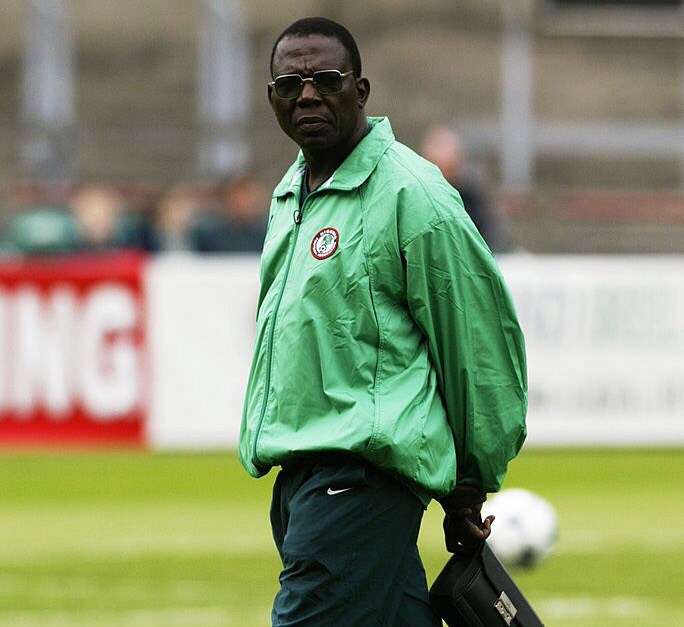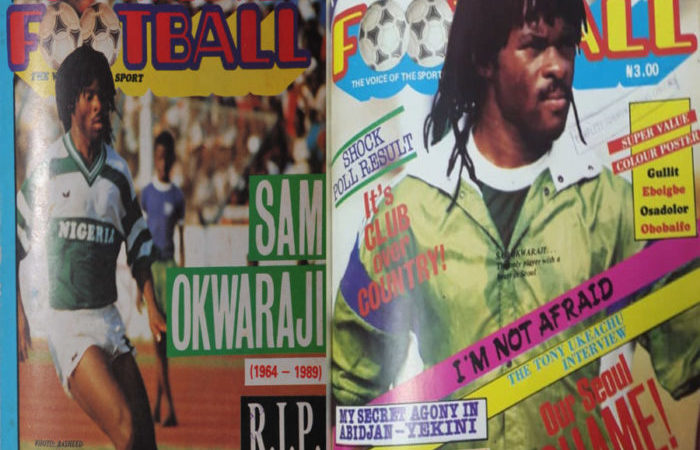[vc_row][vc_column][vc_column_text]
IT is hard to believe that it has been 25 years since it happened. When Mumini Alao told me to reminisce on 1980, as March 22, 2005 would mark 25 years since Nigeria won the African Cup of Nations for the first time, I pretended to take it in my stride! Deep down my mind was in turmoil. 25 years? Where have all the years gone from 1980 to 2005?
I am half-sitting, half-lying in my bed in Festac Town, Lagos in my little 75,000 Naira flat bequeathed to me by the government of Alhaji Shehu Shagari in 1980 as a reward for the little part I played in winning of the African Cup of Nations for Nigeria.
In short, it has been 25 years since that time. Many things have happened. The little flat is now valued at over 10 million Naira. I have aged considerably and the signs are all over me – weak arthritic knees, many children, a married daughter, two grand children, a plethora of both accomplished and unaccomplished dreams and my retirement (some say it is premature) from the hustle and bustle of Lagos to the ‘cool requested vale of life’ of Wasimi Orile and Abeokuta. Fast on the other side (the downward slope) of life I am trying to reconcile with my humanity and my creator by devoting more time and attention to various human causes!
To do what Mumini requested I needed to rewind my life further back than 25 years so that the picture will be complete. I hope I can capture the essence of that period in this article. Enjoy it.
THE PREPARATION
Twenty-five years ago in 1980, I was a young man, the world at my feet literarily, part of a team of football players with a glint in our eyes to conquer the world and do what ‘Napoleon could not do’ – win the African Cup of Nations for Nigeria for the first time. Nigeria was to be host and this was both an advantage and a disadvantage. The advantage was because Nigeria would be playing on home soil before a football-crazy populace plus the abundant sympathies that often went with it. And the disadvantage was because of the pressures usually associated with playing at home – the high, sometimes undeserved expectations and the statistics that indicate that host nations had not often become winners.
Even if we did not appreciate it at the time, those were truly the glorious days of Nigerian football. For four years before the African Cup of Nations the Eagles trained and travelled to all corners of the world. It all started in 1976 shortly before the African Cup of Nations in Ethiopia. From Ethiopia 1976 to Lagos 1980, the Green Eagles, as the national team of Nigeria was called at that time, visited several countries in Africa. Europe, North and South America and Asia competing, training or playing friendly matches as part of the 1976 African Cup of Nations, the Olympic Games of 1976, the All-Africa Games in Algeria and the Cup of Nations of Ghana of 1978, and the African Cup of Nations of 1980. The Green Eagles traversed the world.
THE TRIP TO EUROPE
The summer of 1976 was significant for several reasons. It was the peak of the heat wave that swept through most of Western Europe. It was also the time when Swedish tennis player, Bjorn Borg, was winning the first of his record Wimbledon titles in England. At the same time the Green Eagles were in camp in Hennef, West Germany, in one of the best camping sites in Europe, a school for Football where several Nigerian coaches were trained at the time. From Hennef the team toured several cities in Germany, Bulgaria, Yugoslavia and so on playing mostly against local clubsides. The only national team that accepted to condescend and play an African national team was Bulgaria. Yet they only managed to beat the Eagles by two goals to one in spite of the Eagles’ glaring inferiority complex. African teams were generally regarded by European national teams as not deserving of a friendly game. They were not good enough to play against them.
OLYMPIC EXPERIENCE
The Eagles then went on to Canada and played two friendly international matches on the eve of the 1976 Olympic Games. The second match was against Canada, eventual quarter-finalists. The Eagles won easily. It was a big psychological boost for the team even if Canada were not a major footballing country. That they were a national team playing also in the Olympic mean a lot to the Eagles.
With confidence now soaring, the Eagles were prepared to meet the Brazilian Olympic team in their last arranged friendly before the Games. At the last minute the match was called off by the Brazilians, and Nigeria led an African boycott of the Games. We all still believe the Brazilians became afraid after they saw how the Eagles taught Canada lessons on how to play aggressive attacking football. The team, loaded to the hilt with brilliant individual forwards, had Thompson Usiyen, Haruna Ilerika, Kunle Awesu, Muda Lawal, Baba Otu Mohammed and yours truly in rampaging form.
THE TRIP TO CHINA
As compensation to the players for missing out on the Olympics the Federal Government ‘shipped’ the Eagles to China for a three-week friendly tour. China was a bleak place to visit at the time. It was a continent shut out from the rest of the world. It was a grueling trip that lasted 29 hours of actual flying time in a 707 Ethiopia Airline aircraft that made so much noise my ears were blocked for almost a day after we finally landed. Let me state straightaway that the China that we visited in 1976 is civilizations away from the new China that we see presently on television. The transformation is total. I can’t even relate them. How China has moved from what we saw then to what it is now totally beats my imagination. In comparison, Nigeria has moved in the opposite direction. Sorry for the digression.
I must write a little about our experience when we arrived China. Our plane landed in Peking, the capital of China as it was called then. As our plane was landing, a violent earthquake struck the entire region creating a lot of devastation. Being inside the aircraft we did not feel it. Although the epicenter was not in the Peking area its impact was felt far and near. The airport was hurriedly closed. We were driven through the streets late in the evening to our hotel in central Peking. Along the way we saw the entire population of the city empty unto the streets, standing in clusters away from buildings, sitting or lying under makeshift tents in anticipation of more quakes or aftershocks. Our Chinese hosts were apparently very concerned for our safety and kept the details of what was going on from us. It was on arrival at our hotel that we found out from the guests who had all been evacuated from their rooms and were standing on the street exactly what had happened. Very few of us slept that night in fear. The following morning we were returned to the airport and airlifted to the relative safety of Shanghai in northern China, the largest and the most populous city in the whole of China at that time, some four flying hours away from Peking.
TRAINING IN BRAZIL
Fast track to 1978. There was another round of camping and training in Europe for the Nations Cup in Ghana in 1978. Meanwhile the Eagles were slowly but steadily being built into a compact team. with the hosting right of the 1980 Nations Cup awarded to Nigeria, Chief Isaac Akioye, Director of Sports of the National Sports Commission, a consummate professional sports administrator, and the NFA board led by Mr. Sunday Dankaro, prepared a comprehensive training programme for the national team – a three months training camp in Brazil, the best footballing nation in the world. The camp for the team was a military training institute called CEFAN in the heart of Rio de Janeiro. In this camp one had to eat, think, drink and sleep football. Incidentally, we found out that three months was too much time for anyone to stay away from his environment for camping. Not even Brazil with its beautiful beaches, its beautiful half-clad, half-cast women, its lovely food, great football clubs and football made in heaven could dampen the frustration we all felt with such a long foreign camping.
 However, training in Brazil did several things for us. The level of football and the quality of players that we saw humbled us and made us work doubly hard to catch up. I realized for the first time the gulf that existed between football in South America and the rest of the world especially in Africa. We had the rare opportunity to study the Brazilians closely, to watch their training methods, to play against many of their teams, and to watch many of their league matches. Many of us that went to Brazil came back to Nigeria totally different people. Brazil was a football education for me.
However, training in Brazil did several things for us. The level of football and the quality of players that we saw humbled us and made us work doubly hard to catch up. I realized for the first time the gulf that existed between football in South America and the rest of the world especially in Africa. We had the rare opportunity to study the Brazilians closely, to watch their training methods, to play against many of their teams, and to watch many of their league matches. Many of us that went to Brazil came back to Nigeria totally different people. Brazil was a football education for me.
THE CHAMPIONSHIP PROPER
When we finally returned to Nigeria in January of 1980, the country was in high expectation of our new Brazilian experience and football. Our attitude to the game had changed and it showed on the pitch. We had started to imitate the Brazilians in a lot of ways, from our warm up routines to our patient and slower build-ups, and greater emphasis on set pieces. We started to play with greater confidence and a superior gait. On the eve of the African Cup of Nations the Green Eagles were supremely confident and ready. Four years of building the team made up of wholly home-grown players that had become close friends through the years was paying off. The team displayed it from the first to the last match. In no match was the team really threatened.
By the time we arrived at the final match on March 22, 1980, nothing was going to stop our flight into history .The journey from 1976 had been hard, meticulous, eventful and productive. The product was a team that played like possessed people on that eventful evening when Algeria did not know what hit them. In the presence of the President of the country, Alhaji Shehu Shagari, the Eagles simply blew Algeria away by three goals to nothing!
Don’t tell me 25 years have passed since that glorious day. It seems like yesterday. Where is the wine? Let’s toast to God’s grace over our lives in the past 25 years. Let’s celebrate!
*SEGUN ODEGBAMI, former captain of the “Green Eagles” and second best African player in 1980, wrote this article for his column, “THE MATHEMATICAL” in Complete Sports Saturday, March 19, 2005 in commemoration of the 25th anniversary of Nigeria’s first Africa Cup of Nations victory.
THE SQUAD
GOALKEEPER: Best Ogedegbe (IICC, Ibadan), Emmanuel Okala (Rangers, Enugu), Moses Effiong (NNB, Benin).
DEFENDERS: David Adiele (Insurance, Benin), Christian Chukwu (cpt) (Rangers, Enugu), Tunde Bamidele (IICC, Ibadan), Okechukwu Isima (Standard, Jos,) John Orlando (IICC, Ibadan), Francis Onwuachi (ACB, Lagos).
MIDFIELDERS: Muda Lawal (IICC, Ibadan), Aloysius Atuegbu (Rangers Enugu), Sylvanus Okpala (Rangers, Enugu), Henry Nwosu (NNB, Lagos), Shefiu Mohammed (Raccah, Kano), Godwin Odiye (USA), Kadiri Ikhana (Insurance, Benin), Charles Bassey (Rovers, Calabar).
FORWARDS: Segun Odegbami (IICC, Ibadan), Martins Eyo (Berger, Lagos), Adokiye Amiesimaka (Rangers, Enugu), Felix Owolabi (IICC, Ibadan).
COACH: Otto Gloria (Brazil) Raul Carlesso (Brazil).
[/vc_column_text][/vc_column][/vc_row]



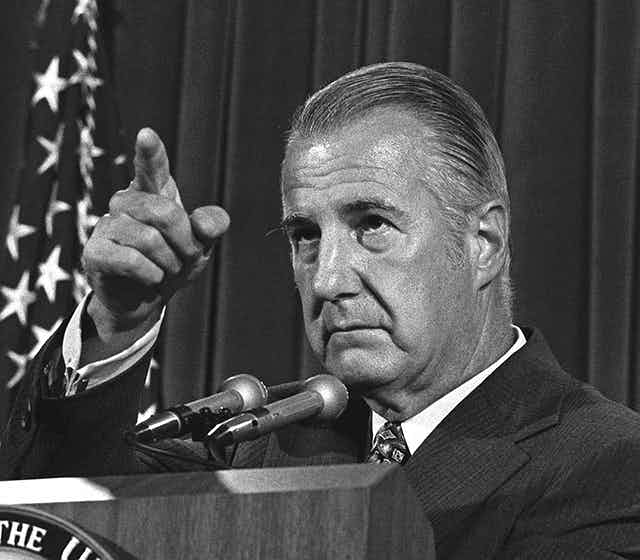
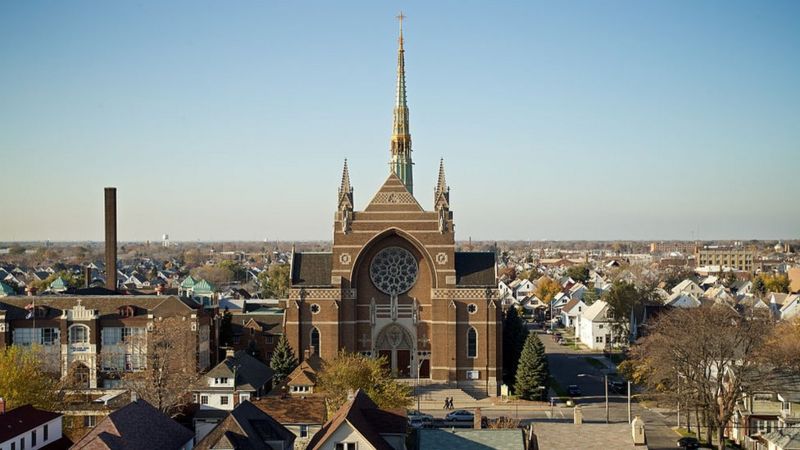
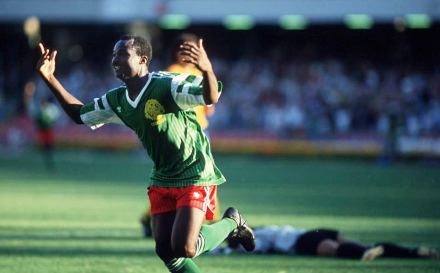
![Podcast EP 18: Late Stephen Keshi on the heartache of Senegal '92 and intrigue of AFCON '94 [Listen] 10 Podcast EP 18: Late Stephen Keshi on the heartache of Senegal '92 and intrigue of AFCON '94 [Listen] 8](https://naijasuperfans.com/wp-content/uploads/2020/05/stephen-keshi-1.jpg)
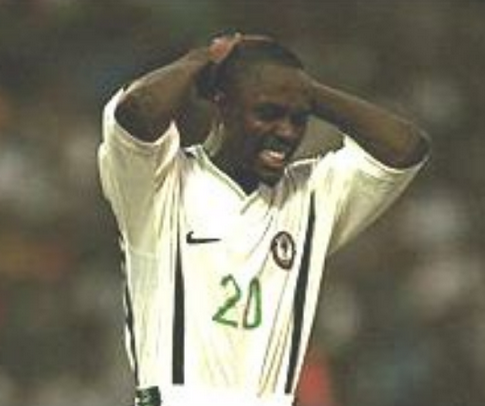
![Watch Odegbami recreate his first goal in the 1980 AFCON final [Video] 12 Watch Odegbami recreate his first goal in the 1980 AFCON final [Video] 10](https://naijasuperfans.com/wp-content/uploads/2020/03/20200323_165745.png)
![How Nigeria won AFCON in 1980 – Segun Odegbami with Mumini Alao [Video] 13 How Nigeria won AFCON in 1980 – Segun Odegbami with Mumini Alao [Video] 11](https://naijasuperfans.com/wp-content/uploads/2020/03/20200321_201622.png)


